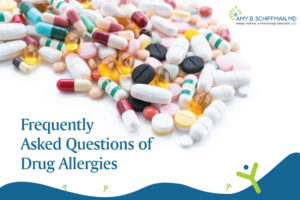What is Drug Allergy?
A drug allergy refers to an irregular reaction of your immune system to a particular medication. Any medication, such as over-the-counter medicines, prescription drugs, and even herbal medicines, can trigger an allergic reaction. Severe reactions caused by drug allergy may result in life-threatening conditions like anaphylaxis. Allergies are different from drug side effects, which are known non-life-threatening reactions listed on drug packaging, and from drug toxicity, which results from taking more than the prescribed or recommended dose.
What are the Symptoms of Drug Allergy?
A drug allergic reaction can affect any part of your body. Here’s a list of possible symptoms:
- Skin rash
- Hives
- Itching
- Wheezing
- Swelling
- Anaphylaxis, a potentially life-threatening reaction that can simultaneously affect two or more organ systems (for example, when there is both a rash and difficulty breathing)
- Fever
- Swelling
- Shortness of breath
- Runny nose
- Itchy, watery eyes
There are also uncommon drug allergy reactions that may occur days or weeks after the drug intake or exposure. These reactions may persist for quite some time even after the drug is discontinued. These symptoms include:
- Inflammation in the kidneys (nephritis) causes fever, blood in the urine, dizziness, and nausea.
- Drug rash with eosinophilia and systemic symptoms (DRESS) causes skin rash, high white blood cell count, inflammation, and swollen lymph nodes.
- Serum sickness – causes fever, joint pain, skin rash, inflammation, and nausea.
- Drug-induced anemia – refers to a reduction in red blood cells. It causes fatigue, irregular heartbeats, and shortness of breath.
- Stevens-Johnson Syndrome – causes flu-like symptoms, followed by a painful rash that spreads and blisters. Then the top layer of affected skin dies, sheds, and begins to heal after several days.
How to Diagnose a Drug Allergy?
Drug allergy can be diagnosed by a skin test (accurate only for penicillin), and a drug challenge. A drug challenge is where the medical staff will supervise you as you take the drug suspected of triggering a reaction. However, it is hard to diagnose because some symptoms of drug allergy resemble other diseases, like skin rashes, hives, and asthma. You need to consult an allergist to diagnose the condition further. An allergist would ask you the following questions during your consultation:
- What drug do you suspect caused your reaction?
- When did you start taking it, and have you stopped taking it?
- How long after you took the drug did you notice symptoms, and what did you experience?
- How long did your symptoms last, and what did you do to relieve them?
- What other medications, both prescription and over-the-counter, do you take?
- Do you consume herbal medications or take vitamin or mineral supplements? If so, which ones?
First, the allergist will perform a physical examination and check for signs of an allergic reaction. Bring the prescription or the suspected drug with you so the allergist can help suggest alternatives if needed. The allergist will discuss skin testing, or in limited instances, blood tests. A blood test can help diagnose a severe, delayed allergic reaction, especially when multiple organ systems may be of concern.
Is Drug Allergy Dangerous?
Drug allergies are not always severe. Most symptoms of a drug allergy are mild, such as an itchy skin rash. However, there is the possibility that a drug may cause a potentially life-threatening reaction, called anaphylaxis.
Anaphylaxis refers to an immediate, full-body allergic reaction to a drug or other allergen. It can occur minutes to hours after taking a drug. Symptoms of anaphylaxis include:
- fainting
- difficulty in breathing
- severe skin inflammation
- unconsciousness
Call 911 immediately or bring the patient to the nearest hospital as soon as possible, should anaphylaxis occur. You can also check out my first aid tips for a severe allergic reaction blog for more information.
What are the Common Drugs that Cause Drug Allergy?
People react differently to a variety of medications. However, certain drugs cause more allergic reactions than others, such as:
- chemotherapy drugs (paclitaxel, docetaxel, and procarbazine)
- antibiotics (penicillin and sulfonamide antibiotics like sulfamethoxazole-trimethoprim)
- monoclonal antibody therapy drugs (trastuzumab and ibritumomab tiuxetan)
- aspirin
- nonsteroidal anti-inflammatory medications (ibuprofen, naproxen)
- anticonvulsants (carbamazepine and lamotrigine)
How to Distinguish Between a Side Effect and Drug Allergy?
According to the World Allergy Organization, a drug allergy is uncommon, accounting for less than 10% of all adverse drug reactions. Usually, it occurs in 1% to 2% of all admissions and 3% to 5% of hospitalized patients. However, the true incidence of drug allergy in the community and children and adults is unknown.
A side effect can occur in any person taking a drug and does not involve the immune system, unlike a drug allergy. Although some medications and drugs are helpful, they may also have unpleasant side effects. For example, aspirin may cause stomach discomfort, and Acetaminophen (Tylenol) for pain at doses above recommended amounts, may cause liver damage.
Where to Get Treated for Drug Allergy?
If you suspect that you may have a drug allergy, consult an allergy specialist.
Dr. Amy Schiffman is an allergy and immunology specialist in Boca Raton, Florida. She is more than happy to help you manage your drug allergies and get the best treatment that best suits you.

